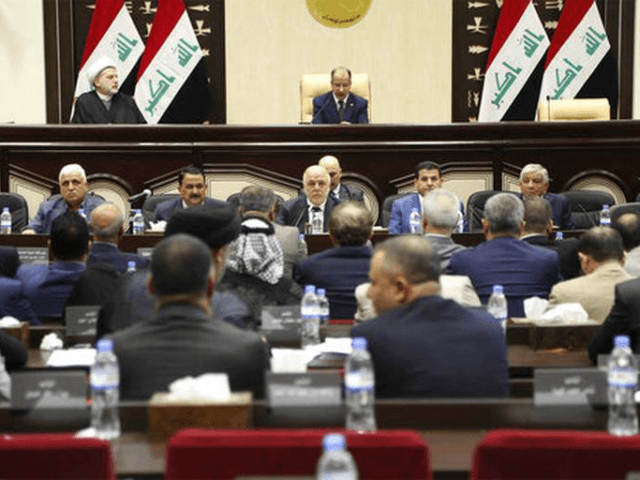Shiite-led Arab lawmakers in Baghdad, Iraq, are punishing their Kurdish counterparts for voting in the independence referendum held by the autonomous Kurdistan Regional Government (KRG) in northern Iraq last week, banning them from participating in parliament and urging the country’s judicial branch to take punitive measures against them.
In a letter to the Higher Federal Court of Iraq, the Shiite-led Iraqi parliament says it plans to “suspend” the predominantly Sunni Kurds’ “membership in the parliament,” reports Kurdish news outlet Rudaw.
The elected lawmaking body also called “for stripping those Kurdish” members of parliament (MPs) “involved in [the independence] vote of immunity and going as far as putting them on trial,” adds the news agency.
Kurdistan 24 blames a coalition of Shiite lawmakers in Iraq of preventing the elected Kurdish MPs from participating in parliament.
“The Kurdish MPs were told that they had lost their legitimacy following the Sep. 25 referendum,” notes the news agency.
Excluding Kurdish MPs linked to the Kurdistan Democratic Party (KDP), lawmakers from all other Kurdish parties reportedly came back to Baghdad to attend the new sessions at parliament hall this week after their Shiite counterparts barred them from participating.
Only those Kurdish lawmakers who “renounce their vote and express regret for taking part in the referendum” would be allowed to participate in parliament, reports Kurdistan 24, citing a bloc of Shiite lawmakers.
Keeping Kurdish lawmakers from attending discussions in parliament allows the lawmaking body “to unanimously issue declarations against the Kurdistan Region as none of the Kurdish lawmakers were allowed to join the session,” points out Rudaw.
Masoud Haideri, an MP from Gorran (Change Movement), denied that Shiite lawmakers were successful in banishing Kurds from the parliament hall this week, telling Rudaw, “No one could stop us from entering the parliament as we constitute one of the main components in Iraq: the Kurdish nation.”
Nevertheless, Kurdish news outlets point out that Shiite MPs did manage to prevent Kurds from taking part in parliament’s deliberations this week, telling them it is in their best interest to return to Kurdistan.
Since Kurds overwhelmingly voted “yes” to independence last Monday, the Shiite-led Iraqi government has taken harsh measures against Kurdistan, including an international flight ban (flights to Iraq are considered “domestic”).
Although a group of Arab tribal leaders affiliated with Iraq’s Sunni minority has expressed support for an independent Kurdistan region, they do not speak for all Sunnis in Iraq.
In coordination with the Shiite National Alliance, believed to be the largest faction in the Iraqi parliament, Salim al-Jabouri, the Sunni speaker of the lawmaking body, has asked the federal court to take legal measures against Kurdish MPs who voted in favor of independence
Despite objections to its independence, the KRG has remained undeterred, calling for a November 1 election to select a president and parliament for the region.
Reuters reports:
The elections would be calculated to reinforce the legitimacy of the leadership ahead of a drive for outright independence and any negotiations that might involve. … The Kurdistan Regional Government (KRG) has not declared independence. The November polls are for parliament and presidency of the region, not for an independent state.
Simmering tensions between the predominantly Sunni Kurds and Shiite Arab lawmakers in Iraq has intensified.
The Shiite-led Iraqi “parliament decided to collect the names of those [Kurdish lawmakers] who voted in the referendum as a step towards their impeachment by the Higher Federal Court,” the Sunni speaker of parliament told reporters, according to Reuters.
Ignoring objections by Baghdad and the United States and angering neighboring Iran and Turkey, the Iraqi Kurds approved the independence referendum.
Neighboring countries, including Syria, oppose the establishment of an independent Kurdistan state because they fear it will push their Kurdish populations to do the same.
Baghdad has threatened military action in coordination with Iran and Turkey before and the independence vote, demanding that the KRG cancel the outcome to avoid repercussions.
Days before the vote, Iraq’s parliament rejected the referendum, dismissing it as a “threat to Iraq’s integrity which is guaranteed by the constitution … in addition to the civil peace and the regional security.”
Iraqi lawmakers voted to stop the controversial vote, calling on Baghdad “to take all necessary measures to preserve that unity.”
Meanwhile, Baghdad has responded to the vote by separating Kurdish MPs from their counterparts in parliament, a move that will likely fuel ethnic strains in the Iraq.
Although the vast majority of Iraqi Kurds consider themselves Sunni, there are some Shiites among the ethnoreligious group, particularly in and around the Kurdish regions in Iran.

COMMENTS
Please let us know if you're having issues with commenting.